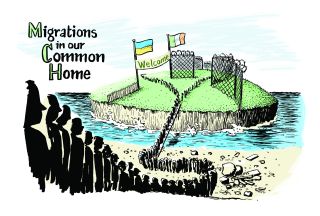Budget 2023 must implement the "blueprint" for International Protection

As of January 2022, there were 8,582 people living in the Direct Provision system spread across 73 locations, comprising both main centres and emergency accommodation. In contrast and addition to those seeking international protection, by the 22nd May 2022, 33,151 Ukrainian refugees have arrived, being granted automatic temporary protection status, with many more expected.
Neither the Day Report from 2020 and the subsequent White Paper in 2021 which sets out Government policy to replace the Direct Provision system and establish a new International Protection Support Service could have predicted this two tier system for those seeking protection. The significant challenges to the implementation of the white paper that existed prior to the Russian invasion of the Ukraine will be all the more as more refugees arrive.
This new system aims to support those applying for protection to integrate in Ireland from day one with health, education, housing and employment supports along the lines of the response to those from the Ukraine. This new system aims to house applicants in new not for profit Reception and Integration Centres for no more than four months. After the first four months, anyone with a claim still in progress will move to accommodation within the community, families with own door and single people will have own room accommodation. As 1,761 individuals with leave to stay were still living in Direct Provision at the end of December 2021, the issue of accommodation will remain a concern. Other supports such as access to as legal aid and assistance, access to work, education and training, access to driving licences and bank accounts are provided for which are all welcome steps. Social Justice Ireland welcomed the commitment in the Programme for Government to abolish the Direct Provision system and move away from the for-profit model.
The development of this new model of delivery was due to begin in February of 2021 in a phased basis until its completion by December 2024 with estimated capital costs of between €446 million and €672 million and current costs of €175 million. As little progress has been made, this needs investment of €500m in Budget 2023. Now more than ever, vulnerability assessments must be prioritised. Social Justice Ireland recommends the introduction of the vulnerability assessments at a cost of €2 million.
Budget Choices 2023 is available to download now.